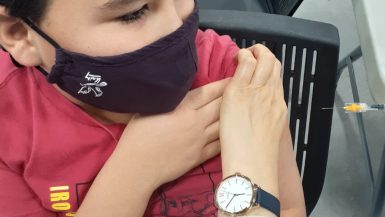
Mark calls me the “wizard.” I can tie and untie knots, fix zippers, spread cream cheese evenly on a slice of bread, summon the tooth fairy, find missing objects, separate two stuck LEGO bricks, take pictures and put them online, open packaging without tearing it apart, remove a temporary tattoo with acetone, make room in the fridge for the lunchbox—
“MOMMY!”
“What’s wrong?”
“… I broke my fingernail.”
“Show me… oh, that’s not too bad. I know! A coat of clear nail polish should help until it grows back.”
“Does it hurt?”
“Nail polish? No!”
“YOU’RE A WIZARD!”
“Maybe it’s Maybelline,” I mutter.
Of course, my skills are remarkably unimpressive if you’ve managed to survive for more than a couple of decades on this planet. Also, little does Mark know that I mostly make it up as I go along.
My latest wizardry? Trying to find the mute button on Mark, the chatty kid in the classroom.
Overall, Mark seems to be a good student. He’s progressing well and there’s no sign of learning disabilities or school phobia. However, this is the second year that we’re told he is chatty. Not troublemaker-chatty, just unable-to-resist-the-urge-to-talk-to-friends chatty.
“But what are you guys even talking about?” I ask, puzzled.
“You know, stuff.”
“No, I don’t. enlighten me.”
“Well, there’s a guy in this movie and he’s really bad so I was telling my friend no way that—”
“Okay, okay, got it. Yeah, stuff.”
I had to cut him off. Mark is chatty. When he starts talking about movies, bad guys and other favourite topics, you’re in for a monologue—he could write a longer The Lord of the Rings trilogy.
Maybe all kids are like that, maybe it’s a stage or his personality, who knows. But at seven, he should understand that talking people’s ear off is not okay. He is getting better at not interrupting us—he used to talk over me constantly—and appreciating silence. Still, it’s a work in progress.
Last year, I made excuses for him. “Seating arrangements are weird,” I noted. “We used to be in rows, facing teachers. But their desks are in groups of four! It’s basically encouraging them to chat.” Besides, it was the first year of French immersion. “If you’d talk to me in Korean all day, I would probably lose focus,” Feng added. “He’s bored because he doesn’t understand the teacher.”
We gave him a classroom behaviour 101 refresher. What else could I do? I’m not in charge at school! And since none of the teachers contacted us throughout the year, we assumed the problem had gone away.
However, this year, during the five-minute meet-and-greet/BBQ, Mark’s three Grade 2 teachers mentioned he was chatty.
Okay, so problem unsolved.
Indeed, Mark admits he is talking in class. “When else would I talk with my friends?”
“Anytime but in class!”
But come to think of it, there aren’t that many “anytime” opportunities. I used to play during the French mandatory 1.5-hour lunch break and walk home with friends, Feng used to roam free in communist China. Mark’s school adopted the “balanced school day” schedule, so he has two 40 minutes breaks—each including 20 minutes to eat in the classroom and 20 minutes of physical activity. All in all, it’s not a lot of unsupervised time to discuss Fortnite and scary movies you’re not supposed to watch.
And outside school, what kind of social life is a seven-year-old supposed to have? We take him to the playground once in a while and to the swimming pool once a week but even though he’s home at 3 p.m., days are short—our workday is far from over and there’s homework, shower, dinner, etc. I’m not adding playdates on top of that, sorry. Besides, it’s a logistical nightmare considering that 1) most kids are in after-school programs or involved in extracurricular activities 2) we’re both working from home 3) we don’t have the typical Ottawa schedule (dinner at 5 p.m., bedtime at 8 p.m.). Hell, I don’t even see my own friends often and it’s not like I have to coordinate with their parents for coffee at Starbucks.
In late September, Mark’s main teacher sent a generic email to all parents. I took the opportunity to ask how Mark was doing. “It’s a work in progress!”
Sounded like she meant “still can’t shut up.”
I decided to get more involved. I couldn’t hide under his desk, but I explained he was usually pretty receptive to self-improvement challenges.
“I can start a ‘No talking challenge’”, I suggested. “Write down every time he talks and he gets a star when he doesn’t for an entire day.”
The teacher agreed to participate and Mark loved the idea. No, seriously, he did—he likes to compete, including with himself.
My goal was twofold—show the teacher we were involved and happy to help and show Mark I was in touch with his teachers and I knew what was going on in class.
I designed the challenge sheet with Mark, printed it out, and hoped for the best.
The first week wasn’t great—there were a few ☹ from all of his teachers. “I didn’t talk… that much,” Mark said.
The magic happened on week two. Finally, happy faces from his main teacher!
Problem solved? No idea. Probably not, but at least we acknowledged it, Mark knows I hold him accountable and hopefully the teachers realize we care as parents and take education seriously.
And that’s what wizardry is about—trying new ways to address issues and hope something works.
Share this article!



>Mark’s school adopted the “balanced school day” schedule, so he has two 40
> minutes break—each include 20 minutes to eat in the classroom and 20 minutes
> of physical activity. All in all, it’s not a lot of unsupervised time to discuss Fortnite
> and scary movies you’re not supposed to watch.
How to train corporate drones, Canadian’s way.
I know, right? That and the lack of school holidays. It makes me sad.
Wow ! Super méthode pour motiver le petit bavard ! J’aime bien cette approche ! Et c’est cool que vous arriviez à le mettre en place avec l’enseignant, en France ce serait impossible à faire je crois …
Really? I can’t remember how flexible teachers were in France. Some were definitely very old school, the emphasis is more on the class rather than on the individual… but I think we were just lucky this year. Last year, his teacher didn’t communicate with parents at all and we had no idea what was going on.
Teachers in France are not very flexible and certainly not very fond of personal challenges … there are rules, and they must be the same rules for every pupil, regardless of each one’s personality
Ah yeah, that’s true. More emphasis on the group rather than on the individual. That’s the greatest strength of the French education system and its weakness at the same time. If you fit in, you’re good. If not… well, good luck :-/
My kids don’t have a learning disability, per se, but they all have “challenges” and particularly struggle to concentrate (who doesn’t?). I don’t want to make a big deal of it, because I remember my own challenges in school, but at the same time I am very pleased to see the school and teachers involved. I’ve had to sign multiple forms to allow the school to do special tests (to identify real learning disabilities if there are some) and have a “special” teacher who works with them individually or in small groups. (There are 34 kids in the twins classroom, so I’m pretty sure that working in a small group for a couple of hours will be a good thing for them AND their main teacher! ) 😆
34 kids? That’s insane!
Mark struggles to focus as well, but I know it’s not a learning disability because he *can* focus (I see him doing so), just not on everything required.
It’s great that your twins get the support they need right now. It’s the best way to solve what looks to be a relatively minor problem 🙂